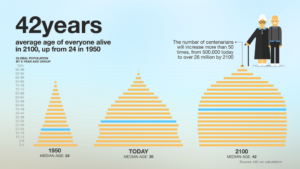
From energy to life expectancy, these crucial statistics could define Earth’s upcoming century.
83 million more people are alive in the world this year than last year. That’s the same as adding a new country the size of Germany.
42 years is the average age of everyone alive in 2100, up from 24 in 1950. The number of centenarians will increase more than 50 times, from 500,000 today to over 26 million in 2100.
66% of the world’s population will live in towns and cities by 2050 – that’s around 6.3 billion people.
Growth in global solar energy consumption between 2010 – 2015 was 664%.
47% of US jobs are at risk from automation.
I – Word Understanding
Crucial – very important
Centenarian – a person who is 100 or more years old
II – Have Your Say
1. How will the world’s population continue to increase? There’s an outside chance the world’s population could be as high as 16.6 billion by the end of the century. Or it could be as low as 7.3 billion – that’s fewer people than the 7.5 billion alive today.
2. Why is the average age rising? How do you think it will affect the future?
3. Where will we be living? Is there a way to control the population in megacities?
4. Where will the world’s energy come from? Which renewable would be the most successful?
5. How likely is your job to be automated in the future? Which jobs do you think will be replaced and which ones will remain?


